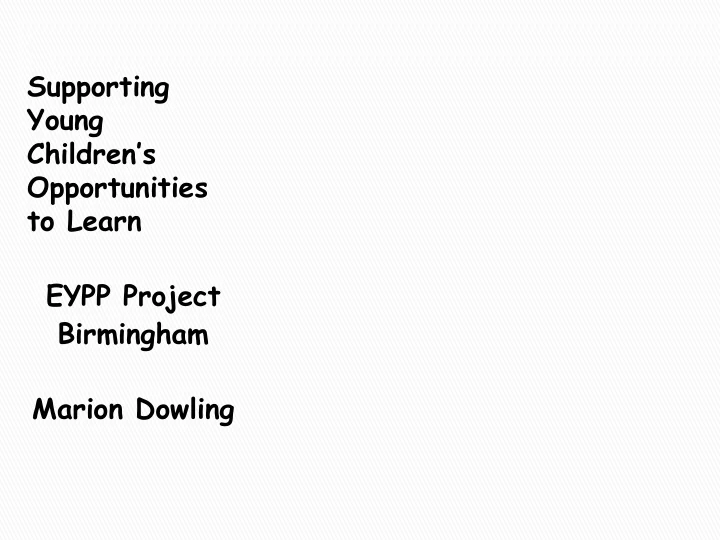

Supporting Young Children’s Opportunities to Learn EYPP Project Birmingham Marion Dowling
Being in charge of their learning Being able to control impulses engaging in mindful, intentional and thoughtful behaviour (Bodrover and Leong 2008 ) Children should be agents in their learning Plowden 1964
Children’s communication and language skills underpins their future academic and social success ( Roulstone: 2011) Many children don’t get the understanding and nurture they need to develop as confident learners and communicators ( I Can: 2006, Bercow Report 2008)
Fluency is the key to influence Communication and language supports children’s : ◦ social development ◦ emotional development ◦ thinking processes
Develop Close Relationships Become attached and attuned to each child and her parent/carer ◦ Warm, secure and consistent links between close adults in nursery/school and parents/carers, have a profound effect on a child’s sense of security ◦ Attunement involves knowing the child intimately, tuning into her messages, being on the same wavelength and responding rapidly ( dance of dialogue)
Be a Learning Companion Offer: companionable attention companionable play companionable conversations companionable apprenticeship
Work with a partner and discuss how successfully you include these four aspects into your practice
Support self belief ◦ young children need to believe in themselves ◦ the way in which we feel about ourselves is reflected in our approach to learning and thinking ◦ fixed and growth mindsets ◦ confidence and self esteem grow out of being listened to and having their thoughts and ideas valued ◦ children with growth mindsets feel in control and have a sense of agency For you: reflect on those children you work with who have growth mindsets and those whose minds are fixed consider two actions that will help the latter group to become more confident and develop agency
Offer Provocations We get better at using words…under one condition and only one…when we use those words to say something we want to say, to people we want to say it to and for purposes that are our own. Holt (1967) How Children Learn For you: what provokes your children to discuss, chatter and ask questions ?
Support Children’s Questions The following actions help children to understand that their questions are important ◦ Keep a questions book and note down children’s questions, particularly those which invite enquiry and reflection. Recount these ( with permission) in small group times and invite children to consider and discuss them ◦ Ask children if they would like to have their question displayed in the room – draw attention to interesting questions that individuals have asked during the week
When and where are children most likely to ask questions ? What types of questions do they ask ? To whom are these questions directed ? What is there in my room that provokes young children to wonder, question and want to investigate further ?
Unhelpful rituals What happened next ? Then what happened ? And then what did the little pig do ? What did the wolf do when he couldn’t blow down the house of bricks ? And then what happened to him ?
Unhelpful rituals Who did what? What was the name of …? Who put the plate on the table ? What time of day did the old man wake up ? And then what did he say ?
Help children to engage with the text and interrogate what is going on Encourage them to relate the story to experiences in their own lives Expand their vocabulary – introduce new verbs and descriptors
Show genuine pleasure at the prospect of the child’s company Give your full attention, having eye contact, listening, smiling nodding Affirm, using ‘tags’ to show your continued interest Invite the child to elaborate Recap to help the child to ‘stick’ to his story Clarify the child’s ideas
Encourage further thinking Offer an alternative viewpoint Reciprocate
When young children are encouraged to think about what might be, instead of being asked ‘what is’, the sophistication of their thinking is often revealed .( Craft (2010) Creative Thinking and Creative Development) ◦ What does that remind you of ? ◦ What happens if I do {touch} this ? ◦ Is there another way ? ◦ How could we ? ◦ What might happen if… ? ◦ What would you do if…? ◦ What about this bit here…? ◦ How could we make it safe ? ◦ I wonder if…?
Involvement Interpretation Interaction Inspiration Intervention But not interference delete
A moment of shared enjoyment What’s it like Ruby ? It makes my tongue tremble and shake.
Recommend
More recommend